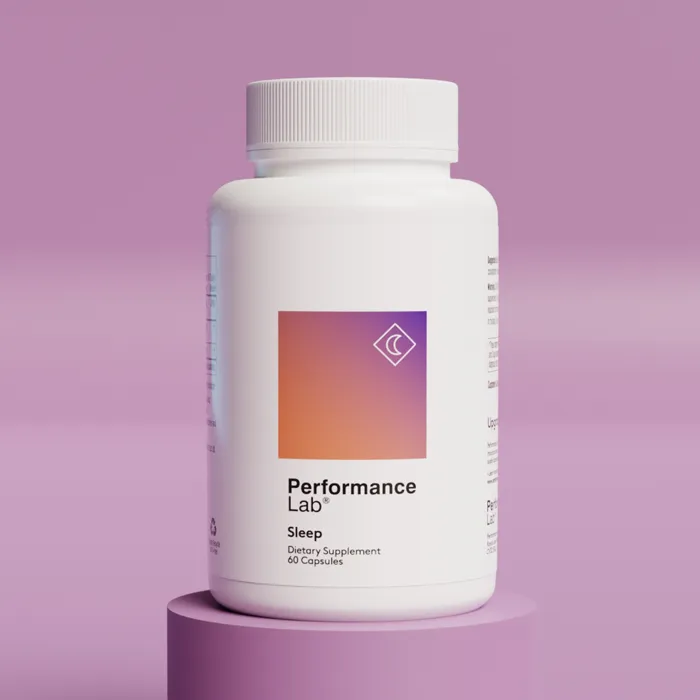We’ve all been there before. Your eyes become sensitive, you feel thumping travel from the base of your skull, and noise becomes overwhelming - it’s the beginning of that dreaded headache that won’t seem to go away.
While headaches can arise from any number of factors - muscle tension, dehydration, injury, lack of sleep, alcohol consumption, stress, weather - there’s often one avenue we don’t think about: nutritional deficiencies.
Low magnesium levels have been linked to headaches and migraines, and not surprisingly, most people don’t get enough of the mineral. But whether you’re boosting dietary intake or supplementing, it’s all about finding the right dose.
If you struggle with headaches, this article is for you. We’ll cover the basics of magnesium, its link to headaches, and what happens from supplementing too much.
Let’s get started.
Key Takeaways
- Magnesium itself rarely “causes” headaches—the bigger issue is that low magnesium status is linked to headaches and migraines in many people.
- Deficiency may contribute via neurotransmitter imbalance, vascular tone changes, and cortical spreading depression pathways associated with migraine.
- When side effects occur from excess supplemental magnesium, they’re typically GI-related (e.g., loose stools), not headaches; true hypermagnesemia is rare and usually medical-context-driven.
- Well-absorbed forms (e.g., bisglycinate/glycinate) are generally gentle and are often used in sleep, stress and migraine-support regimens.
- Performance Lab® Sleep and NutriGenesis® Multi provide magnesium within clean, balanced formulas that fit daily routines.

What Is Magnesium and Why Do We Need It?
We’ve all heard about magnesium before - and if you’re in the fitness world, chances are it concerns muscle tension. It’s touted as one of the best supplements for supporting relaxation and sleep, but that’s not all the mineral is good for.
Magnesium is the fourth most abundant cation in the human body and the second most abundant intracellular (inside cells) cation after potassium 1.
Roughly 99% of total body magnesium is found in bone, muscles, and non-muscular soft tissue, of which about 50-60% of it resides on the surface of bone tissue as hydroxyapatite; the remainder is housed in skeletal muscle and soft tissue.
While bone provides one of the most abundant pools to buffer acute changes in magnesium levels, bone magnesium concentration decreases with age, so supplementation becomes even more critical.
Although magnesium’s most notable role is supporting muscle relaxation and serving as an electrolyte, it performs numerous other physiological functions.
Magnesium is required as a cofactor for over 300 enzymatic reactions involved in enzyme stabilization; most enzymes are involved in ATP production, and because ATP is required for virtually every biological process in the body, sufficient magnesium concentrations and intake are essential.
What processes are we talking about 1?
- Glucose utilization
- Fat, protein, and nucleic acid synthesis
- Muscle contraction and relaxation
- Neurological function
- Neurotransmitter release
- Vascular tone
- Bone formation
- Mitochondrial biogenesis
Without sufficient magnesium, your body wouldn’t be able to function optimally, which is why imbalances and deficiencies can be detrimental to your body.
Forms Of Magnesium
Unlike most other nutrients, magnesium supplementation isn’t straightforward. While you’ll find only one form of magnesium in food, there are plenty of options for pills and powders:
- Magnesium bis-glycinate: Elemental magnesium combined with the amino acid glycine. Glycine is often used to improve sleep, which means magnesium bis-glycinate is excellent for sleep, stress, anxiety, and insomnia - and it’s one of the most bioavailable forms of magnesium.
- Magnesium oxide: Magnesium combined with oxygen. Absorption is not high on this firm, so it’s commonly used for short-term relief of digestive symptoms 2.
- Magnesium chloride: Magnesium salt that includes chloride. It’s relatively well-absorbed in the GI tract and is a great multi-purpose magnesium supplement 2.
- Magnesium malate: Magnesium combined with malic acid. It’s commonly found in fruit and wine, giving an acidic taste or flavor. It’s well absorbed in the GI tract and is great for replenishing magnesium levels 3.
- Magnesium citrate: Bound with citric acid and naturally found in fruits, giving them their characteristic tart, sour flavor. Some research suggests this form is more bioavailable and readily absorbed in the GI tract, but it can also cause a laxative effect when taken in high doses 4.
- Magnesium taurate: Magnesium bound with taurine. The two compounds are essential for promoting healthy blood sugar regulation and blood pressure 5-8.
- Magnesium sulfate: Magnesium combined with oxygen and sulfate. It’s commonly referred to as Epsom salts and is great for relieving achy and sore muscles and promoting relaxation. However, there’s minimal evidence that it’s well absorbed through the skin.
Which form of magnesium you choose will depend on what you’re taking it for - boosting serum concentrations, relieving stress, supporting sleep, or curbing headaches.
Can Magnesium Cause Headaches?
While there’s much talk about how magnesium is beneficial for promoting calmness and muscle relaxation, what’s this we hear about magnesium causing headaches? There’s little conclusive evidence to suggest that excess magnesium can cause headaches, but there is potential.
That said, little evidence suggests that too much magnesium can cause headaches. Instead, the opposite seems to be true. A large body of evidence shows a strong relationship between magnesium deficiency and mild and moderate tension-type headaches and migraines 9.
While the mechanisms behind the link between magnesium and headaches are complex and beyond the scope of this article, there’s one thing in common with most studies: people with low magnesium levels tend to be more susceptible to migraines and headaches.
A magnesium deficiency has been shown to promote cortical spreading depression, alter nociceptive processing and neurotransmitter release, and encourage hyper-aggregation of platelets, all of which contribute to migraines 10.
Low magnesium levels also contribute to vasoconstriction, which results in that pounding feeling in the head, commonly associated with a headache. Research supports the role of magnesium as a safe and well-tolerated treatment for migraines, tension-type headaches, and cluster headaches.
As magnesium deficiency worsens, several more severe symptoms can arise, including numbness and tingling, involuntary muscle contractions, cramping, seizures, behavior changes caused by excessive electrical activity in the brain, personality changes, and abnormal heartbeat 1.
So, the simple solution? Supplement and boost your dietary intake of magnesium.
Side Effects Of Too Much Magnesium
Although magnesium is typically safe and well-tolerated, it’s not a supplement to go crazy with. Too much magnesium can lead to some unwelcome - and potentially dangerous - side effects, including 11:
- Irregular heartbeat
- Low blood pressure
- Slowed breathing
- Coma
- Nausea
- Abdominal cramping
- Diarrhea
- Muscle weakness
- Lethargy
- Cardiac arrest
Treading into hypermagnesemia territory isn’t something you’ll want to do, which means finding the correct magnesium dose is critical - and once you find it, there are plenty of benefits to enjoy.
Related Post: Can You Overdose on Magnesium?
Benefits Of Getting Your Magnesium Dose Right
We’re not going to get into the details about all the incredible benefits of supplementing with magnesium, but when you can find the perfect dose of the best magnesium form, here’s what you can look forward to:
- May improve exercise performance
- Improves mood
- Supports healthy blood sugar regulation
- Promotes heart health
- Reduces inflammation
- May help prevent migraines
- Improves PMS symptoms
- Supports bone health
- Improves sleep quality
- May reduce anxiety symptoms
Magnesium and other nutritional supplements are all about finding the correct dose. Not too much, not too little, but as Goldilocks says, juuuuust right.
If you want to take the guesswork out of getting enough magnesium, check out Performance Lab Sleep. It’s the ultimate natural sleep formula to help you rest, recharge, and wake up ready to perform.

Featuring natural low-dose melatonin from Montmorency tart cherries, L-tryptophan, and three forms of magnesium, Sleep supports sleep-supportive muscle relaxation for consistent sleep patterns and nightly mind-body cell renewal. It’s peak performance packed into the cleanest and most effective sleep supplement on the market.
References
- Jahnen-Dechent W, Ketteler M. Magnesium basics. Clin Kidney J. 2012;5(Suppl 1):i3-i14.
- Schuchardt JP, Hahn A. Intestinal Absorption and Factors Influencing Bioavailability of Magnesium-An Update. Curr Nutr Food Sci. 2017;13(4):260-278.
- Uysal N, Kizildag S, Yuce Z, et al. Timeline (Bioavailability) of Magnesium Compounds in Hours: Which Magnesium Compound Works Best?. Biol Trace Elem Res. 2019;187(1):128-136.
- Walker AF, Marakis G, Christie S, Byng M. Mg citrate found more bioavailable than other Mg preparations in a randomised, double-blind study. Magnes Res. 2003;16(3):183-191.
- ELDerawi WA, Naser IA, Taleb MH, Abutair AS. The Effects of Oral Magnesium Supplementation on Glycemic Response among Type 2 Diabetes Patients. Nutrients. 2018;11(1):44.
- Sak D, Erdenen F, Müderrisoglu C, et al. The Relationship between Plasma Taurine Levels and Diabetic Complications in Patients with Type 2 Diabetes Mellitus. Biomolecules. 2019;9(3):96.
- Zhang X, Li Y, Del Gobbo LC, et al. Effects of Magnesium Supplementation on Blood Pressure: A Meta-Analysis of Randomized Double-Blind Placebo-Controlled Trials. Hypertension. 2016;68(2):324-333.
- Abebe W, Mozaffari MS. Role of taurine in the vasculature: an overview of experimental and human studies. Am J Cardiovasc Dis. 2011;1(3):293-311.
- Maier JA, Pickering G, Giacomoni E, Cazzaniga A, Pellegrino P. Headaches and Magnesium: Mechanisms, Bioavailability, Therapeutic Efficacy and Potential Advantage of Magnesium Pidolate. 2020;12(9):2660.
- Yablon LA, Mauskop A. Magnesium in headache. In: Vink R, Nechifor M, editors. Magnesium in the Central Nervous System . Adelaide (AU): University of Adelaide Press; 2011. Available from: https://www.ncbi.nlm.nih.gov/books/NBK507271/
- Office of dietary supplements - magnesium. NIH Office of Dietary Supplements. https://ods.od.nih.gov/factsheets/Magnesium-HealthProfessional/. Accessed August 8, 2022.
















